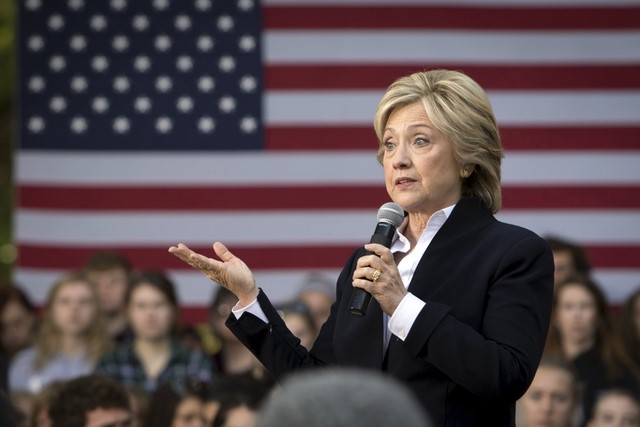By Amanda Becker and John Whitesides
WASHINGTON (Reuters) - U.S. Democratic presidential candidate Hillary Clinton said on Wednesday she does not support the 12-nation Trans-Pacific Partnership (TPP), rejecting a central tenet of President Barack Obama's strategic pivot to Asia.
Clinton, who backed the developing trade pact when she was secretary of state during Obama's first term, said she was worried the agreement would not do enough to crack down on currency manipulation or protect consumers from excessively high drug prices.
"The bar here is very high and, based on what I have seen, I don't believe the agreement has met it," Clinton said in a statement issued during a campaign swing through Iowa.
"I don't believe we can afford to keep giving new agreements the benefit of the doubt. The risks are too high that, despite our best efforts, they will end up doing more harm than good," Clinton said.
The TPP deal, reached on Monday after marathon talks between the United States and 11 Pacific Rim nations, aims to liberalize commerce in 40 percent of the world's economy and would be a legacy-defining victory for Obama.
Clinton's opposition, however, could help her shore up support from labor groups and liberal Democrats who oppose the pact out of concern it will cost manufacturing jobs and weaken environmental laws.
It is the latest in a series of moves by Clinton to distance herself from key administration policies as she tries to hold off a challenge from the left by Bernie Sanders, a U.S. senator from Vermont, and prepare for a possible presidential run by Vice President Joe Biden.
Clinton's once-commanding lead in polls of Democratic voters has diminished amid a lingering controversy about her use of a private e-mail server when she was secretary of state, giving rise to speculation that Biden could enter the race.
Her announcement on the TPP comes just a week ahead of the first televised debate of the Democratic presidential contenders.
Obama and Biden have pushed for the trade deal, arguing it would help the United States increase influence in East Asia and counter the rise of China, which is not part of the pact.
"The president has been extraordinarily effective in making as strong a case as could be made, but I do worry we have an equation here, how do we raise incomes in America?" Clinton said in an interview with PBS's "Newshour," where she first announced her opposition to the trade pact.
Clinton has distanced herself from the Obama administration on other policies recently, announcing opposition to the Keystone XL pipeline, backing a no-fly zone over Syria and offering plans to expand and change Obamacare, the president's signature healthcare reform.
All of those shifts could help differentiate her from Biden, who if he enters the race will be in the position of defending the administration on many of those issues.
Richard Trumka, president of the AFL-CIO labor group, which opposes the pact, praised Clinton.
"Her decision is a critical turning point and will be invaluable in our effort to defeat TPP," Trumka said.
Sanders and fellow Democratic presidential rival Martin O'Malley, both longstanding critics of the trade pact, also welcomed Clinton's decision, but noted her shifting position.
"I am delighted that Secretary Clinton is on board," Sanders said during an appearance at the Congressional Hispanic Caucus Institute. "To be very frank with you, it would have been more helpful to have her on board a few months ago."
O'Malley, the former governor of Maryland, said in a statement: "Secretary Clinton can justify her own reversal of opinion on this, but I didn't have one opinion eight months ago and switch that opinion on the eve of debates."
The TPP deal, which must be approved by the U.S. Congress, has faced skepticism from lawmakers.

A White House official said Clinton gave the administration a heads-up about her position before the interview.